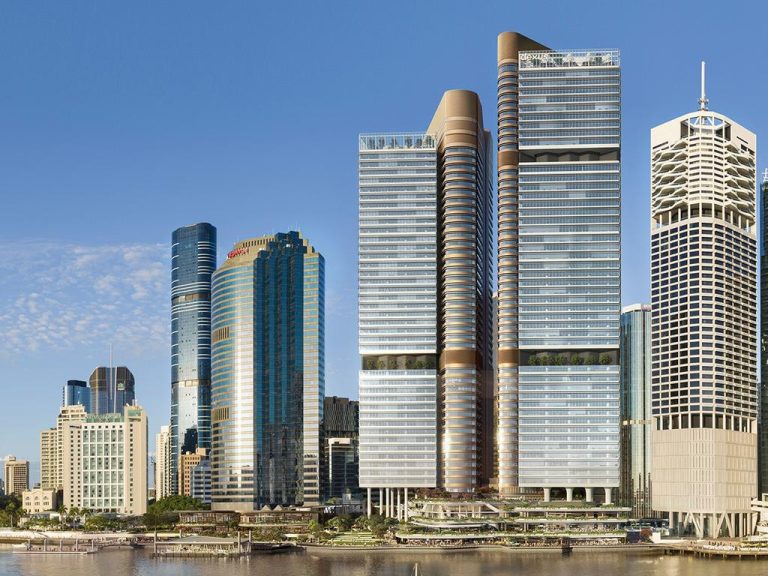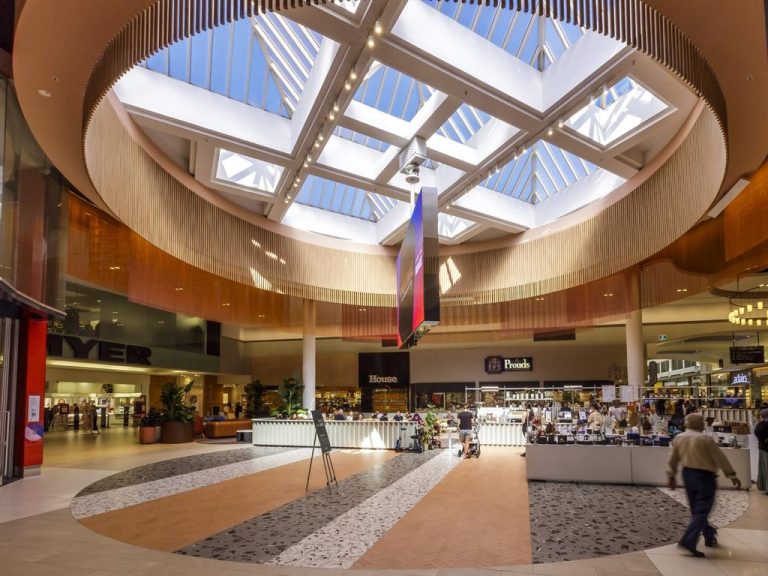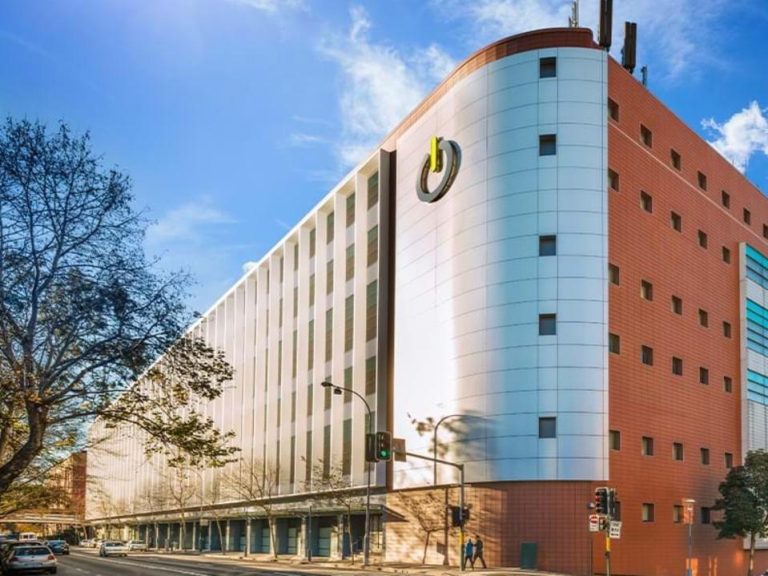Auschwitz survivor selling entire block of Bondi beachfront flats

Auschwitz survivor Freda Feuerstein’s block of flats overlooking Bondi Beach cost £11,000 in 1958. Now they’re set to go under the hammer with a $12 million price guide.
The block of four rundown Art Deco flats, currently housing Brazilian backpackers on cheap rent above what’s now Trio restaurant at 56 Campbell Parade, is listed with Michael Pallier and Joseph Raskin of Sotheby’s, for December 8 auction.
And it’s a gold mine, just four doors down from where casino mogul James Packer sold his bachelor pad for $29 million in 2018.
From her retirement home in Israel, where she lives close by her son, Yehuda Engelman, and his family, Mrs Feuerstein, 95, revealed she’d previously knocked back offers from Packer to buy it, along with many others.
“But I would say it’s not for sale,” she said.

The block is just four doors down from where James Packer sold for $29m in 2018.

Mark and Freda and young Yehuda Engelman in Czechoslovakia 1948 shortly before they headed to Australia.
The intention had been to keep it for her family, but since they’d decided not to redevelop the “small building on a great site” it was time to let someone else have a go.
Now it’s being offered with concept plans by top architect Brian Meyerson for a multistorey single residence even grander than Packer’s, which was snapped up by father-and-son property investors Roy and Anthony Medich.
Yehuda, 73, a project management consultant in Israel, says it was a tough decision for his mother to part with the property after so many years.
“That building has been her security through thick and thin,” he said.

What a location!

Bondi Icebergs is close by.
“She’s looking at it and thinking ‘are you sure you can take that security away and not drop the ball’.
“While you’ve got bricks and mortar, you know you’ve got an income and can keep your head above water.”
It was Yehuda who relayed the fascinating story to the Sunday Telegraph of how his parents fled post-war Europe and came to purchase the Bondi flats and retail space.
His mother, Freda, and father Mark Engelman, both miraculously survived internment in Nazi concentration camps during World War II.

The sea plane that brought the Engelmans to Rose Bay in 1948.

Freda and Mark in their Elizabeth Street, Sydney, delicatessen in the early 1950s.
Freda was taken from the Mukachevo ghetto in 1944 and spent a year in Auschwitz in Poland and Mark had been in Bergen-Belsen in Germany after “running round doing as much damage as he could to the Germans as a partisan until he got caught”.
“They’d been dating before the war and when they found each other alive after the war they said ‘Let’s get married’ … there were so few survivors,” Yehuda said. Freda was 23 and Mark 25 when Yehuda was born in 1947 in the Czech region the Nazis contested that was called Sudetenland.
Most of the couple’s siblings and their parents had been killed, but Freda’s brother and sister and Mark’s brother also survived and, still being teenagers, arrived in Sydney under an Australian Jewry program to provide guardians for orphans from the Holocaust.
“In 1948 the communists took over in Czechoslovakia and wanted to enlist my father in the army,” Yehuda said. But his father had no intention of joining the communists. “When they came for him, he said ‘The guy you’re looking for is my brother, come back tomorrow when he will be back!’ ’’
They fled to Belgium and then to Australia where they were reunited with their family. Having trained as a baker in Europe, Mark got a job at the Six Waves Bakery in Hall St, Bondi.
Their introduction to the Bondi Beach flats came in 1952 via one of his customers, who, having seen the dive they’d been living in, said: “That’s no way for a family to live.” She recommended one of the rear flats at 56 Campbell Parade.

Frank Lowy (far right) with his brother, John (far left); mother Ilona and sister Edith on Australia Day in 1952 outside their Darling Point flat.

Crowds enjoying Bondi Beach in Sydney circa 1950.
After their misery in Europe, the family’s good fortunes were soon on the rise in Sydney. Over a period of five years, Mark went from working in the bakery to taking over the business; selling that and buying a delicatessen in Flinders St, Darlinghurst and then in Elizabeth St (his business partner was the late Sam Moss, who went on to be co-founder of Katies and whose Point Piper waterfront sold recently for $95 million).
Yehuda remembers a young Frank Lowy, who went on to create the retail giant Westfield, delivering bread rolls to his father’s deli. “Because my father was one of the first Jewish immigrants to buy real estate in Sydney, Frank asked my father ‘how do you go about buying real estate?’
Lowy was also a Czech refugee who arrived in Sydney in 1952 via Israel and started a business delivering smallgoods.
By the time Freda heard the apartment block was being sold in 1957 — from a neighbour — Mark had sold the deli and set up a furniture shop in Kingsford with his brother.
“That’s how they were able to accumulate enough money to put a down payment in 1958,” Yehuda said.
Even when they owned the building, the family continued living in the rear flat, needing the rent money for the front apartments with the beach view to meet their mortgage repayments.

The view from one of the bedroom windows at 56 Campbell Parade, Bondi Beach.

A recent photo of Freda with her son, Yehuda (foreground) and granddaughter Anat and family in Israel.
Mrs Feuerstein, then Mrs Engelman, has many fond memories bringing up her son there. “The neighbours and local people were very nice and helpful,” she said.
“I remember the lights on the old pine trees at Christmas time, with the happy crowds picnicking on the grass opposite our place.
“They also held weddings there, even one of my tenants got married there.”
Even back then, she says Bondi Beach was popular with visitors from all over the world.
Yehuda said he and his mother moved into one of the front apartments with the glorious beach view in 1963 when he was 14 after his parents’ divorce. “It was terrific to have that view … I used to be woken up by the sunrise and I’d put on my cossies, grab a towel, walk down the hill and I wouldn’t even be fully awake until I dived into the water at Bondi Icebergs.
“Walking to school, we could see if the surf was up. If it was, we could opt for the latter,” he said.
This article from the Wentworth Courier originally appeared as “Auschwitz survivor Freda’s Bondi Beach flats that cost £11,000 in 1958 have $12m price guide”.







